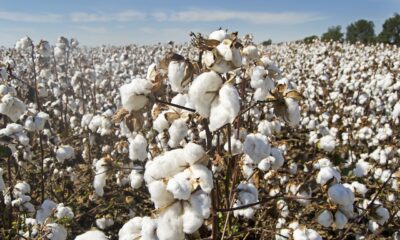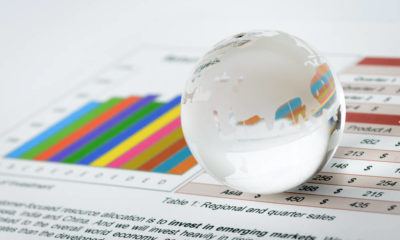Africa
Burkina’s Economy on the Rise in February 2024, Report Shows
Burkina Faso’s economy saw a 5.5% growth in 2024, up from 3.6% in 2023, attributed to all sectors. Inflation remained controlled at 2.5%. Industrial production decreased by 4.9% in February 2024, mainly due to extractive activities. Retail turnover slowed by 5.8%, while commercial services turnover increased by 7.6%. Gold production rose monthly but fell annually.

The General Directorate of Economy and Planning (DGEP) has made public its Economy and Development Monitoring Report for March 2024. These are essentially the figures covering the month of February 2024. Several data emerge from the report No. 132.
According to the report, national economic activity in Burkina continues to expand by increasing by 5.5% in 2024 compared to 3.6% in 2023. This performance is attributable to all sectors, with an increase in added value of 5. 1% for primary, 4.5% for secondary and 7.0% for tertiary, we can read in the document.
As for inflation, it would remain under control below the community standard of 3% maximum, rising to 2.5% in 2024 compared to 0.7%.
In February 2024, industrial production was down 4.9% year-on-year compared to an increase of 0.7% a month earlier, the report specifies. “This poor performance is mainly linked to the sharp deceleration of extractive activities, mitigated somewhat by an increase in the production and distribution of electricity, gas and water.”
If you want to find more about Burkna’s economy and find the most important economic news from around the world, download for free our companion app Born2Invest.
Trade turnover index
Retail turnover recorded a deceleration of 5.8% on a monthly basis during the month under review compared to 6.5% the previous month.
The document indicates that this deceleration is mainly linked to the slowdown in activity in the “housing equipment”, “automobiles, motorcycles and spare parts” and “petroleum products” branches, attenuated by the increase in activity in the branch. “food products”. It is also attributable to the decline in the “miscellaneous products” branch.
Burkina’s economy: Turnover index in market services
In February 2024, turnover in commercial services increased by 7.6% year-on-year compared to 0.6% a month earlier. This performance is attributable to the increase in the activity of “information and communication services”, “services for human health and social action”, “artistic, sporting and recreational services”, “transport services, warehousing” as well as “Other services nec [absolute non-consumer]”, mitigated by the drop in activity in “Accommodation and catering services”.
Industrial production of gold in tonnes
According to the report on Burkina’s economy, in February 2024, industrial gold production stood at 4,522 tonnes, up 5.1% from the previous month. However, compared to its level in February 2023, gold production falls by 16.4%. At the end of February 2024, total industrial gold production was 8,824 tonnes compared to 9,055 tonnes at the end of February 2023, a decrease of 2.6%.
The monthly increase in gold production in February 2024 is mainly due to the increase in production from the mines of Roxgold Sanu (+216.4%), Hounde Gold (+71.6%) and Somisa (SANBRADO ) (+65.9%).
Tourism and hospitality
Still in the second month of 2024, tourism and hospitality indicators are on the rise. Indeed, the country recorded 44,957 tourists, an increase of 1.0% compared to the previous month. Concerning the number of nights, it stands at 104,739, an increase of 8.3%.
As for revenues, the report on Burkina’s economy estimated them at 5.2 billion FCFA, an increase of 7.6%. However, compared to the same month a year earlier, arrivals and receipts are down 0.9%. As for overnight stays, they increased by 5.5%.
It should be noted that these positive figures are achieved in a national context marked by an unprecedented security crisis.
__
(Featured image by Jakub Żerdzicki via Unsplash)
DISCLAIMER: This article was written by a third party contributor and does not reflect the opinion of Born2Invest, its management, staff or its associates. Please review our disclaimer for more information.
This article may include forward-looking statements. These forward-looking statements generally are identified by the words “believe,” “project,” “estimate,” “become,” “plan,” “will,” and similar expressions. These forward-looking statements involve known and unknown risks as well as uncertainties, including those discussed in the following cautionary statements and elsewhere in this article and on this site. Although the Company may believe that its expectations are based on reasonable assumptions, the actual results that the Company may achieve may differ materially from any forward-looking statements, which reflect the opinions of the management of the Company only as of the date hereof. Additionally, please make sure to read these important disclosures.
First published in lefaso.net. A third-party contributor translated and adapted the article from the original. In case of discrepancy, the original will prevail.
Although we made reasonable efforts to provide accurate translations, some parts may be incorrect. Born2Invest assumes no responsibility for errors, omissions or ambiguities in the translations provided on this website. Any person or entity relying on translated content does so at their own risk. Born2Invest is not responsible for losses caused by such reliance on the accuracy or reliability of translated information. If you wish to report an error or inaccuracy in the translation, we encourage you to contact us

-

 Fintech2 weeks ago
Fintech2 weeks agoFintech Alliances and AI Expand Small-Business Lending Worldwide
-

 Crypto7 days ago
Crypto7 days agoBitcoin Steady Near $68K as ETF Outflows and Institutional Moves Shape Crypto Markets
-

 Fintech2 weeks ago
Fintech2 weeks agoDruo Doubles Processed Volume and Targets Global Expansion by 2026
-

 Business2 days ago
Business2 days agoDow Jones Stalls Near Record Highs as Inflation-Fueled Rally Awaits Next Move

















